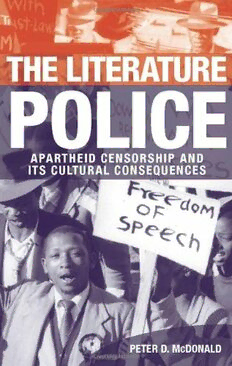Download The Literature Police: Apartheid Censorship and Its Cultural Consequences PDF Free - Full Version
Download The Literature Police: Apartheid Censorship and Its Cultural Consequences by Peter D. McDonald in PDF format completely FREE. No registration required, no payment needed. Get instant access to this valuable resource on PDFdrive.to!
About The Literature Police: Apartheid Censorship and Its Cultural Consequences
'Censorship may have to do with literature', Nadine Gordimer once said, 'but literature has nothing whatever to do with censorship.' As the history of many repressive regimes shows, this vital borderline has seldom been so clearly demarcated. Just how murky it can sometimes be is compellingly exemplified in the case of apartheid South Africa. For reasons that were neither obvious nor historically inevitable, the apartheid censors were not only the agents of the white minority government's repressive anxieties about the medium of print. They were also officially-certified guardians of the literary. This book is centrally about the often unpredictable cultural consequences of this paradoxical situation. Peter D. McDonald brings to light a wealth of new evidence - from the once secret archives of the censorship bureaucracy, from the records of resistance publishers and writers' groups both in the country and abroad - and uses extensive oral testimony. He tells the strangely tangled stories of censorship and literature in apartheid South Africa and, in the process, uncovers an extraordinarily complex web of cultural connections linking Europe and Africa, East and West. The Literature Police affords a unique perspective on one of the most anachronistic, exploitative, and racist modern states of the post-war era, and on some of the many forms of cultural resistance it inspired. It also raises urgent questions about how we understand the category of the literary in today's globalized, intercultural world.
Detailed Information
| Author: | Peter D. McDonald |
|---|---|
| Publication Year: | 2009 |
| ISBN: | 9780191557842 |
| Pages: | 433 |
| Language: | English |
| File Size: | 7.565 |
| Format: | |
| Price: | FREE |
Safe & Secure Download - No registration required
Why Choose PDFdrive for Your Free The Literature Police: Apartheid Censorship and Its Cultural Consequences Download?
- 100% Free: No hidden fees or subscriptions required for one book every day.
- No Registration: Immediate access is available without creating accounts for one book every day.
- Safe and Secure: Clean downloads without malware or viruses
- Multiple Formats: PDF, MOBI, Mpub,... optimized for all devices
- Educational Resource: Supporting knowledge sharing and learning
Frequently Asked Questions
Is it really free to download The Literature Police: Apartheid Censorship and Its Cultural Consequences PDF?
Yes, on https://PDFdrive.to you can download The Literature Police: Apartheid Censorship and Its Cultural Consequences by Peter D. McDonald completely free. We don't require any payment, subscription, or registration to access this PDF file. For 3 books every day.
How can I read The Literature Police: Apartheid Censorship and Its Cultural Consequences on my mobile device?
After downloading The Literature Police: Apartheid Censorship and Its Cultural Consequences PDF, you can open it with any PDF reader app on your phone or tablet. We recommend using Adobe Acrobat Reader, Apple Books, or Google Play Books for the best reading experience.
Is this the full version of The Literature Police: Apartheid Censorship and Its Cultural Consequences?
Yes, this is the complete PDF version of The Literature Police: Apartheid Censorship and Its Cultural Consequences by Peter D. McDonald. You will be able to read the entire content as in the printed version without missing any pages.
Is it legal to download The Literature Police: Apartheid Censorship and Its Cultural Consequences PDF for free?
https://PDFdrive.to provides links to free educational resources available online. We do not store any files on our servers. Please be aware of copyright laws in your country before downloading.
The materials shared are intended for research, educational, and personal use in accordance with fair use principles.

